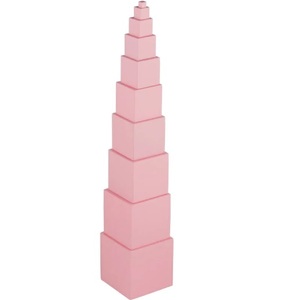Cultural Subjects in Montessori: Nurturing Young Explorers Through Geography, History, and Science
Posted By Kinder huis
Body
Montessori education, renowned for its holistic approach, extends far beyond traditional academic subjects. In the Montessori classroom, children are not just learners; they are young explorers delving into the rich tapestry of the world. Cultural subjects, encompassing geography, history, and science, play a pivotal role in this exploratory journey. In this blog, we'll navigate through the vibrant landscapes of these subjects, understanding their significance in Montessori education. Along the way, we'll explore how essential Montessori tools like the Montessori Pink Tower pave the path for this enlightening expedition.
- Geography: Exploring the World Beyond Borders
In Montessori classrooms, geography isn't merely about memorizing countries and capitals; it's an immersive exploration of the world. Through interactive maps, globes, and puzzle pieces, children embark on a journey across continents and oceans. They learn about diverse cultures, traditions, and ecosystems, fostering a deep sense of global awareness and empathy. Montessori educators introduce geography in a progressive manner, starting from the immediate environment and gradually expanding to encompass the entire planet. This approach nurtures a genuine curiosity about the world and a respect for its diverse inhabitants.
- History: Unraveling the Threads of Time
History in Montessori education is a fascinating tale of humanity's journey through time. Children explore historical timelines, ancient civilizations, and significant events that have shaped the world. Through storytelling, artifacts, and timelines, history comes alive in the Montessori classroom. Children develop a keen understanding of cause and effect, learning from the triumphs and challenges of the past. This knowledge not only enriches their understanding of the world but also instills a sense of responsibility as global citizens.
- Science: Cultivating Curiosity and Inquiry
Montessori science education is a hands-on exploration of the natural world. Through experiments, observation, and classification activities, children delve into the mysteries of biology, physics, and chemistry. The Montessori approach emphasizes not just learning scientific facts but understanding the scientific method. Children are encouraged to ask questions, hypothesize, experiment, and draw conclusions, fostering a spirit of inquiry and critical thinking. Montessori science materials, meticulously designed to engage young minds, transform abstract scientific concepts into tangible, experiential knowledge.
- Montessori Pink Tower: Building Foundations for Learning
The Montessori Pink Tower, a seemingly simple set of pink cubes varying in size, holds profound educational significance. Beyond its aesthetic appeal, the Pink Tower serves as a foundational Montessori tool. Through this tactile experience, children refine their visual discrimination, coordination, and concentration skills. The Pink Tower also introduces the concept of size gradation, laying the groundwork for understanding mathematical principles and spatial relationships. In the context of cultural subjects, the Pink Tower becomes a metaphor for the structured, yet infinitely diverse, world that children are exploring.
Conclusion: Nurturing Inquisitive Minds with Montessori Store Resources
As we conclude our exploration of cultural subjects in Montessori education, it's evident that these subjects are not isolated segments of learning but interconnected threads in the fabric of knowledge. Geography, history, and science empower young learners to appreciate the world's diversity, understand humanity's collective heritage, and marvel at the wonders of the universe.
In this educational odyssey, the Montessori store becomes an essential ally. It's a treasure trove of educational resources, providing Montessori tools, materials, and supplies that enrich the learning experience. From geography puzzles to historical artifacts and science experiment kits, the Montessori store bridges the gap between classroom learning and real-world exploration. It equips educators with the tools they need to inspire curiosity and fuel the flames of discovery in young hearts.
In the hands of dedicated Montessori educators and curious young minds, cultural subjects cease to be mere lessons; they become voyages of discovery, shaping informed, empathetic, and inquisitive individuals. Through geography, history, and science, children learn not just about the world but also about themselves, their place in the grand tapestry of humanity, and the endless possibilities that await their exploration. The journey continues, guided by the wisdom of the past and the curiosity of the future, all nurtured within the embracing arms of Montessori education and its invaluable resources.












Comments